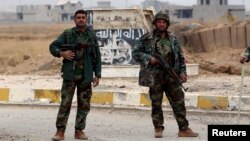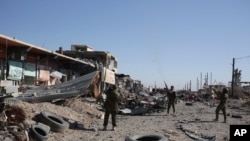The human rights group Amnesty International accused Iraqi Kurds Wednesday of deliberately destroying thousands of homes of Arabs in northern Iraq in apparent revenge for their perceived support for Islamic State militants.
In a new report it called "Banished and Dispossessed," Amnesty International said Peshmerga forces carried out the widespread destruction in Ninevah, Kirkuk and Diyala provinces over the last year as they reclaimed lands that Islamic State fighters had overrun in 2014. The rights group said Kurdish troops bulldozed, blew up or burned down homes in Arab communities and have not allowed their residents to return to the villages where they lived.
Donatella Rovera, who carried out Amnesty International's research in northern Iraq, said, "The forced displacement of civilians and the deliberate destruction of homes and property without military justification may amount to war crimes."
Islamic State insurgents took control of a wide swath of northern Iraq and northern Syria a year a half ago, although Kurdish fighters, supported by a massive U.S.-led aerial bombardment of Islamic State targets, have since then reclaimed about 40 percent of the territory.
Army Colonel Steve Warren, a spokesman for the U.S.-led coalition in Iraq, said it takes the issues raised by the Amnesty International report "very, very seriously."
Amnesty International said it based its report on visits to 13 villages and towns, the accounts of 100 eyewitnesses and displaced residents, as well as satellite imagery showing the destruction of the homes.
Avenging ‘past abuses’
The rights group said Kurdish leaders have justified the displacement of the Arabs on grounds of security, but said "it appears to be used to punish them for their perceived sympathies" with Islamic State fighters and to consolidate their own territorial gains in northern Iraq.
"This is part of a drive to reverse past abuses by the Saddam Hussein regime, which forcibly displaced Kurds and settled Arabs in these regions," Amnesty International said.
"Many farmed the land and herded animals in and around their villages," Amnesty International said, "and have not only lost their homes but also their livelihood. Displaced families are now sheltering in camps for internally displaced persons, where conditions are dire and humanitarian assistance woefully inadequate, or in disused or unfinished buildings lacking sanitation and basic facilities."
The rights group quoted one local resident, Maher Nubul, as saying that he left his village, Tabaj Hamid, in August 2014 when Islamic State fighters captured it. He said that the village's houses were still standing when Peshmerga forces retook the community four months later, but that Peshmerga forces subsequently bulldozed the village.
"I don't know why," Nubul said. "There is nothing left. They destroyed everything for no reason."
In response to the Amnesty International report, a spokesman for Iraq's Kurdistan region, Dindar Zebari, said there is "no strategy planned" to destroy the villages. He said Peshmerga forces "have been in full obligation to implement the standards of and principles of international human rights."





